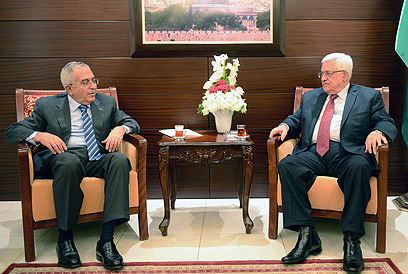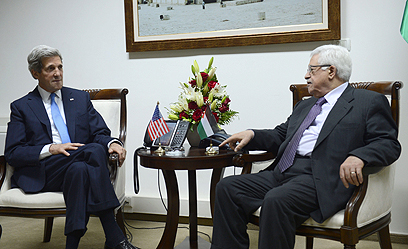
Abbas accepts Palestinian PM Fayyad's resignation
Palestinian president accepts prime minister's resignation despite US, European efforts to resolve crisis. Kerry urged both men to work out differences, to no avail
Palestinian Prime Minister Salaam Fayyad met with President Mahmoud Abbas in Ramallah on Saturday and tendered his resignation. Abbas accepted it.
Fayyad offered his resignation on Thursday, and has been waiting for Abbas' reply.
Related stories:
- Kerry urges Abbas him to mend ties with Fayyad
- Abbas under pressure to back Fayyad
- Palestinian PM Fayyad offers resignation
American and European officials have put pressure on Fayyad to withdraw his resignation as well as on Abbas to refuse to accept it.

Fayyad and Abbas in Ramallah (Photo: EPA)
A source in Abbas' office said that Fayyad had stressed in the meeting that he will not continue to head the Palestinian government even if the entire world asked him to stay on.
On Thursday, US Secretary of State John Kerry phoned Abbas and asked him to resolve the crisis.

Under pressure. Abbas and John Kerry (Photo: EPA)
An official statement issued by Abbas' office said that during their meeting Fayyad expressed his deep appreciation for the Palestinian president and his support of the Palestinian government's work. Abbas on his part thanked Fayyad and praised him for his work in building state institutions "during tough times."
The Palestinian president asked Fayyad to stay on until a new government is formed. Among those said to have good chances of replacing Fayyad as prime minister are Mohammad Mustafa, chairman of the Palestine Investment Fund and Mazen Sinokrot, businessman and former economy minister.

Fayyad during protest in Billin
Fayyad's resignation comes amid fierce criticism of his economic policy which saw repeated strikes in the West Bank's public sector in protest of Fayyad's anti-deficit measures.
Relations between Abbas and Fayyad worsened last month after the latter accepted the resignation of the finance minister, against Abass' advice. According to a Palestinian source, Fayyad had prepared his letter of resignation as early as March 23 but postponed its submittal due to US President Barack Obama's visit to the region.
A squeaky-clean public image and willingness to take on entrenched interests has often landed him in trouble with Abbas' long-ruling Fatah movement.
Fayyad has good ties with the US and is credited with cracking down on public corruption, securing foreign aid and preparing the groundwork and infrastructure for a future Palestinian state.
Backed by hundreds of millions of dollars in international aid, Fayyad has built roads and schools and promoted transparency in the government's finances. With the Palestinian Authority stuck in a financial crisis, Fayyad has come under public criticism for the cash-strapped government's failure to pay the salaries of teachers and civil servants on time.
Fayyad has been in office since being appointed in June 2007 by Abbas, following the takeover of Gaza by the rival Islamic militant Hamas. Fayyad's authority is largely limited to the West Bank, while Hamas continues to control Gaza.
Hamas spokesman Fawzi Barhoum criticized rival Fayyad in a statement following his resignation, saying he and his government "worked to protect the Zionist occupation and US interests."
Hamas regarded Fayyad as a staunch enemy as he controlled the security forces who arrested many of the terrorist movement's members.
During Fayyad's tenure, Israel and the Palestinian Authority expanded their security cooperation which significantly reduced the number of terrorist attacks in the West Bank and in Israel. Nevertheless, Fayyad spearheaded the Palestinian initiative to ban settlement goods.
- Receive Ynetnews updates directly to your desktop










